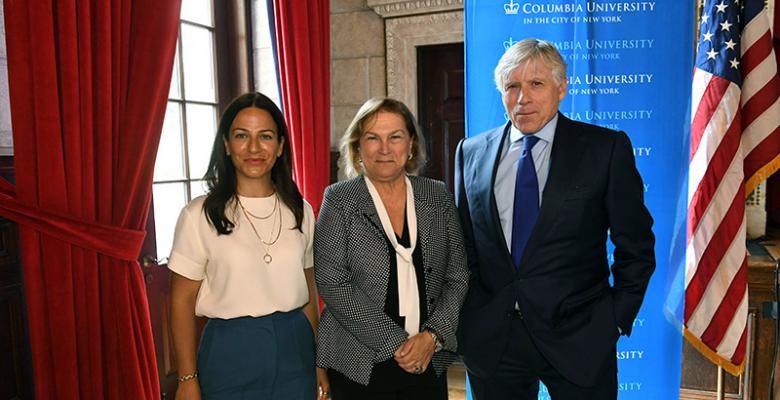Columbia Inaugurates Sakıp Sabancı Center for Turkish Studies

On May 4, the University celebrated the launch of the Sakıp Sabancı Center for Turkish Studies.
“An understanding of the politics, history, culture, and religion of the Turkish people is central to navigating many of the challenges we face in this century,” said University President Lee C. Bollinger who attended the launch at Columbia’s Italian Academy along with scholars, students, alumni and members of the general public interested in Turkey and Turkish Studies.
The center, which will be based on the Morningside Heights campus, is named for the late Sakıp Sabancı (1933-2004), a philanthropist and businessman who after taking the helm of his family business in 1967, transformed it into one of the largest conglomerates in the region, with more than 30,000 employees. Along with other members of his family, his philanthropy includes a museum, foundation, an international research award, and Sabancı University. Sakıp Sabancı’s daughter Sevil Sabancı, a board member at both Sabancı Holding and Sabancı University, was also in attendance to celebrate the Center.
Columbia’s official presence in Turkey began in 2011 with the opening of the Columbia Global Center in Istanbul. “Now thanks to the Sakıp Sabancı Center and the generosity of the Sakıp Sabancı family, we stand ready to deepen our engagement with Turkey in all kinds of ways,” said Bollinger.
The study of Turkey and its people has been part of Columbia’s curriculum for decades, including the teaching of modern and Ottoman Turkish history and literature. More than 140 students from Turkey currently study at Columbia, comprising one of the largest numbers of such students at a university in the U.S., Bollinger added.
Noting that the Sakıp Sabancı Center will be the first endowed and named Center for Turkish Studies at a university in the United States, David B. Madigan, executive vice president for Arts and Sciences, said, “The Sakıp Sabancı Center here on our campus is an invaluable asset for deepening and strengthening Columbia’s links with Turkey.”
Totaling $10 million, the Sakıp Sabancı gift also establishes the Sakıp Sabancı Chair in Turkish Studies in the Faculty of Arts and Sciences.
“This is a gift that will undoubtedly keep on giving for many years to come,” said Holger A. Klein, interim director of the Sabancı Center and professor in the Department of Art History and Archaeology.
İpek Cem Taha (BUS’93, SIPA’93), director of the Columbia Global Center in Istanbul, was instrumental in the engagement with the Sakıp Sabancı family for this gift. At the launch, she introduced businesswoman Güler Sabancı, chairperson of Sabancı Holding, president of the board of trustees of Sabancı University, and Sakıp Sabancı’s niece.
“It’s a special and proud day for us,” said Güler Sabancı, thanking several people, including Safwan Masri, executive vice president for Global Centers and Global Development at Columbia. She noted that her uncle had his heart in Turkey, but that it was not limited to its borders. “He had an international vision that built bridges among cultures, among countries, across disciplines, between ideas, and between people. I’m sure he would be very pleased.”
The Sakıp Sabancı Center has already co-sponsored and organized panel discussions, films and the launch of Nobel laureate and Columbia professor Orhan Pamuk’s latest novel, The Red-Haired Woman. Ayşe Kadıoğlu, political science professor at Sabancı University, and Columbia political science professor John Huber also co-chaired a panel, “Human Rights and Hybrid Regimes,” that analyzed the stresses democracies are facing today in Turkey and around the world.
“The interest shown by the community to these events has been very encouraging,” said Güler Sabancı.
In Turkey, the Sabancı Foundation sits on the European side of Istanbul, and Sabancı University is situated on the Asian side just across the Bosphorus. This well might serve to symbolize the Sabancı family’s philanthropic contributions as a bridge between Turkey, the region, and world.